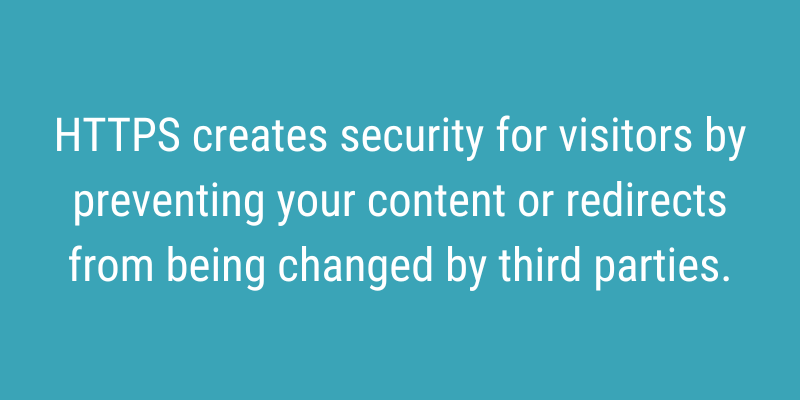HTTP to HTTPS Migration
HTTPS migration may not be on top of your technical SEO list but there are so many reasons to move to HTTPS. Migrating to HTTPS is not as difficult as you might think. It is a simple process that can be completed in just one day, and the benefits are well worth the time and effort: apart from the slight ranking boost, Google made it very clear that they really want us to protect our site and our users.
What is the difference between HTTP and HTTPS?
HTTP and HTTPS are the two main protocols for transferring data on the internet. HTTP is unsecured while HTTPS is secured. This means that HTTPS provides an extra layer of security by encrypting data before it is sent from a user’s device to a website’s server. This makes it much more difficult for someone to intercept and read the data, as they would need to decrypt it first.
HTTPS also verifies that the website you are sending data to is the legitimate website that it claims to be. This is done through a process called SSL (Secure Sockets Layer) or TLS (Transport Layer Security). When you visit a website over HTTPS, your browser will check to see if the website’s SSL/TLS certificate is valid and trusted. If it is, you will see a green padlock in the address bar, which indicates that the connection between your browser and the website is secure.
So, in summary, HTTPS is more secure than HTTP because it uses encryption and verification to protect data as it travels between users and websites.
Data sent using HTTPS is secured via Transport Layer Security protocol (TLS), which provides three key layers of protection:
- Encryption. Encrypting the exchanged data to keep it secure from eavesdroppers. That means that while the user is browsing a website, nobody can “listen” to their conversations, track their activities across multiple pages or steal their information.
- Data integrity. Data cannot be modified or corrupted during transfer, intentionally or otherwise, without being detected.
- Authentication. Proves that your users communicate with the intended website. It protects against man-in-the-middle attacks and builds user trust, which translates into other business benefits.

Websites that use the HTTPS protocol can offer significantly more security to their visitors by encrypting the connection between the website and the visitor’s browser, making it harder for attackers to intercept sensitive information.
How to migrate from HTTP to HTTPS?
Migrating your website from HTTP to HTTPS can be a daunting task, but it’s worth it in the long run. Here are some tips on how to make the transition:
- Make sure your hosting provider supports HTTPS. If they don’t, you’ll need to switch to a new host.
- Use a tool like Let’s Encrypt to generate your SSL certificate. This is a free and easy way to get started with HTTPS.
- Update your website’s code to reflect the new HTTPS address. This includes changing any hard-coded URLs, as well as updating any third-party scripts or plugins that may be loading resources from your site.
- Test everything thoroughly! Make sure all of your pages are loading correctly under the new HTTPS address before you make the switch live for everyone.
- Finally, update your DNS records to point to the new HTTPS address for your site. Once that propagates, you’re all set!
What are the risks and drawbacks of a HTTPS migration?
There are a few risks and drawbacks to migrating your website from HTTP to HTTPS. First, it’s important to note that HTTPS is not a perfect solution. While it does provide some security benefits, it is not foolproof. There are still ways for hackers to intercept data being sent between your website and visitors’ browsers.
Second, migrating your website from HTTP to HTTPS can be a bit of a technical challenge for you technical SEO team. You’ll need to make sure your server is configured properly and that all of your website’s assets are updated to https:// URLs. If you’re not comfortable with making these changes yourself, you may need to hire a web developer or consultant to help you out.
Finally, there is the potential for negative SEO impact when migrating from HTTP to HTTPS. This is because Google treats https:// and http:// as two different websites. So, if you’re not careful, your website’s search engine rankings could take a hit after migrating to HTTPS. This is usually only a temporary issue, but it’s something to be aware of nonetheless.
Who is Gerry White?
Gerry White is a technical marketing consultant working with Just Eat supporting SEO on the 14 sites they operate around the world, including apps, mobile, technical and outreach. Ensuring that the sites are organic leaders in the markets they operate in.
With a 17 year history in digital – Gerry has worked on sites from the BBC, McDonalds, Premier Inn and DirectGov in various roles from digital analyst, site search but usually in SEO, as well as spending a large part of his career agency side.
Gerry White also co-runs a digital roundtable conference called Take It Offline which aims to replicate the best of the post-pub conversations, typically in a pub.

What is the Benchmark Search Conference?
The one-day event features world-class speakers that cover all of the need-to-know search marketing topics to develop and advance your brand’s search engine presence, including:
Organic search (SEO) – how to achieve and maintain your brand’s ranking in natural search engine results and ensure your customers can easily find you.
Paid search (PPC) – driving targeted traffic to your website by showing ads in search engine results when people search for related keywords.
Social media – enhancing brand awareness and advocacy to support your search visibility; your social authority is increasingly considered by Google as a ranking factor.
Content marketing – how to be smart with your content campaigns to build trust and credibility by returning relevant answers to search queries, and earning quality backlinks.
Who’s behind Benchmark?
Located in North West England, Click Consult is a multi-award-winning search marketing agency with a focus on organic (SEO) and paid search (PPC). With over 70 professionals employed and a portfolio of over 60 clients from across the UK, Click Consult works with businesses looking for a measurable return from their search marketing budget.
Click Consult also provides a range of other services, including content marketing, inbound marketing and conversion rate optimisation (CRO), as well as international and multilingual search.
The company is Google AdWords and Microsoft adExcellence certified and is on the Recommended Agency Register.


Leave a Reply